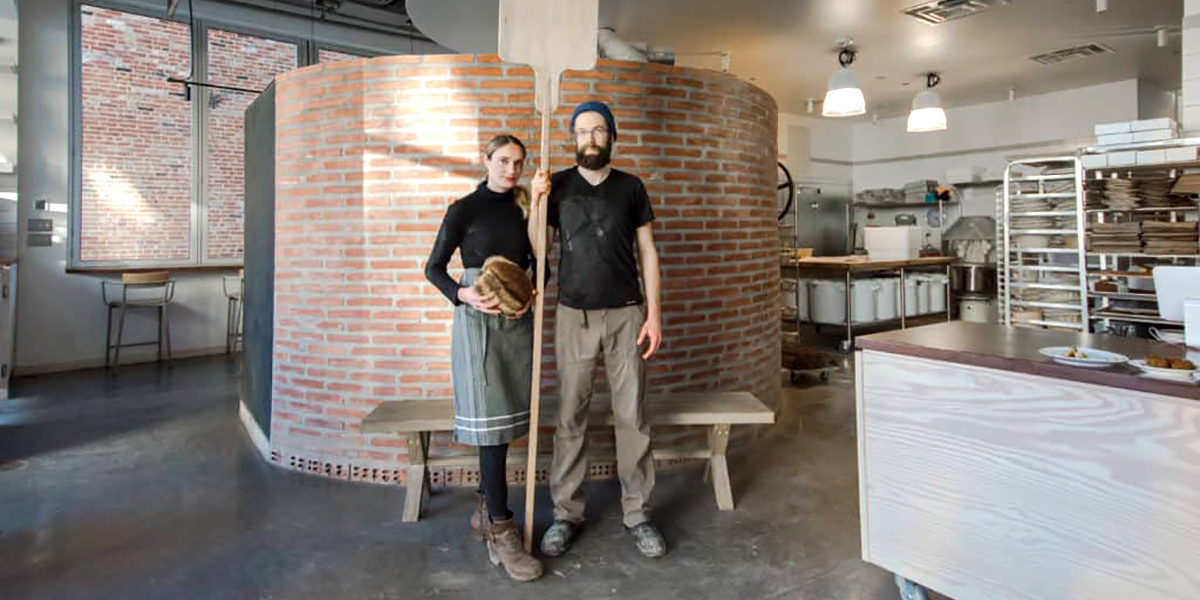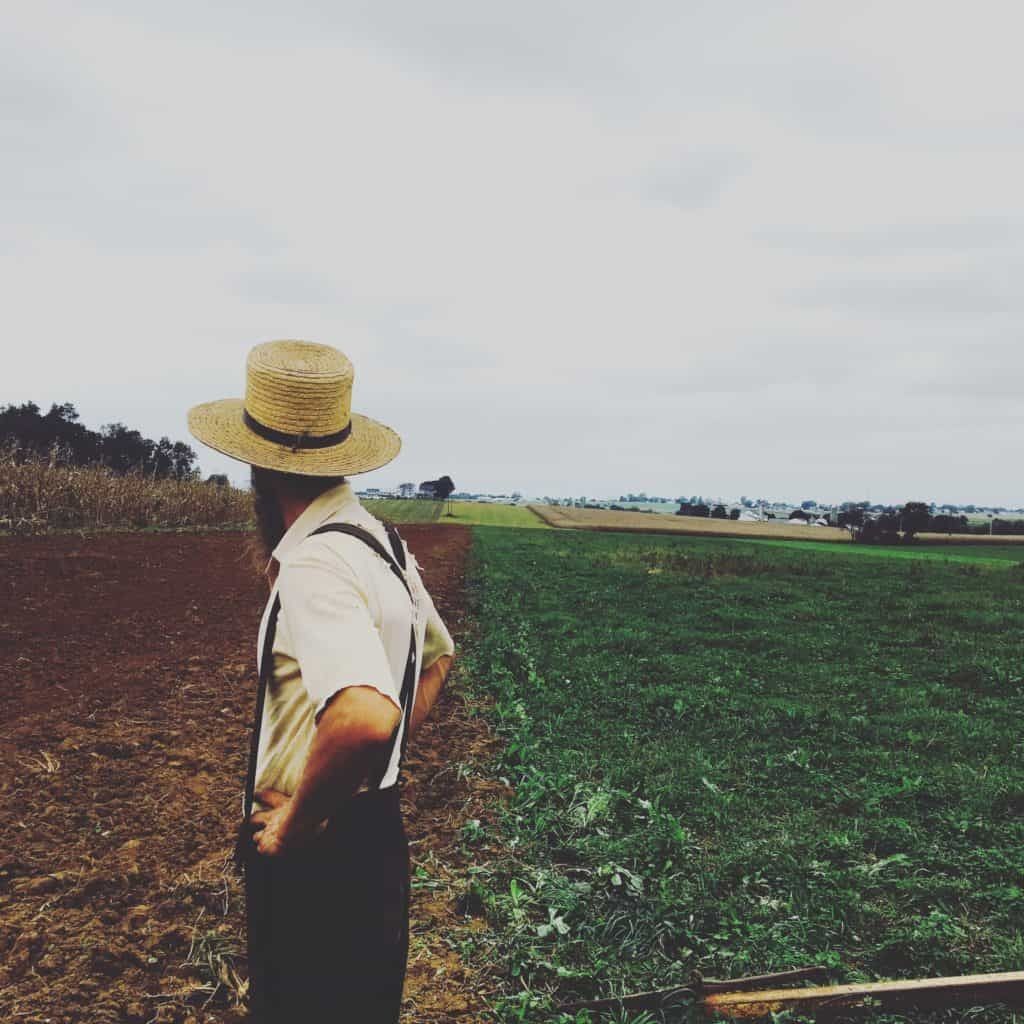

Food Tank spoke with Jonathan Bethony about what makes SEYLOU bread unique.
By Sammy Blair
SEYLOU is a bakery and mill in Washington DC built around the art of whole grain baking. SEYLOU works with local farmers to source organic seeds to bake into 100 percent whole grain breads, and creates nutritious pastries and baked goods to reinstate bread as a part of a healthy diet.
Jonathan Bethony is the co-owner and Head Baker at SEYLOU. Bethony trained at Michel Suas’ San Francisco Baking Institute, worked at Washington State University’s Bread Lab, and has collaborated with top farm to table chefs, including Dan Barber and Marc Vetri, for fresh ways to cook local grains. He’s transformed baking using science, creativity and local food to make breads healthier for humans and the planet.
Food Tank spoke with Jonathan about what makes SEYLOU bread unique, and how the local, whole grain-focused bakery is changing the food system and the way we perceive baked goods.
Food Tank (FT): How can the practices you’re promoting with SEYLOU help support communities struggling with food security?
Jonathan Bethony (JB): We are totally committed to maximizing nutrition in every product produced and sold. A chocolate chip cookie, for example, is something typically not associated with healthy eating. Rather than using conventional white flour with low nutritive value, we use locally grown organic whole millet which is high in fiber, protein and minerals. Instead of refined sugar, we use locally produced sorghum syrup, rich in flavor and containing vitamins and minerals. We use dark chocolate, which contains antioxidants and less sugar than milk chocolate chips. Because these whole foods are so flavorful, we only need half the normal amount of sweetener to make delicious products.
A common obstacle to healthy food is the cost. Though our bread cost is ostensibly higher when compared to bread produced by other vendors in the industrial system, I am confident that every dollar spent at SEYLOU goes toward real food. Our real food provides the maximum health and sustenance value possible, good paying jobs and money directly in the pockets of farmers.
Our “Pain au Levain,” for example, is US$11 or US$6.50 for those on food assistance, but it is a complete food—a large, hearty whole wheat loaf full of protein, carbohydrates, fiber, vitamins, minerals and essential fatty acids. Unlike a loaf of sliced bread in a bag, you cannot smash this two-pound whole grain loaf into a ball the size of your fist. It will provide 5-8 servings of nutritious food and will last for a week without additives.
At SEYLOU, we are striving to provide an alternative to the commodity-based industrial food system by forming a direct connection between regional farms and consumers. The entire value chain must have the mark of integrity and be grounded in ethics and sustainability. We hope to be a hub for the Local Food movement and an intersection between this movement and those with the power to set policy.
SEYLOU is an organization committed to recognizing a greater system beyond the bakery, wherein education and active community engagement are critical to revitalizing a system in which access to quality nutrition is accessible to all.
FT: How is your bread nutritionally different than commercially produced bread?
JB: At SEYLOU we mill all of our grains fresh before mixing and fermenting them for up to 24 hours. Think of the difference between a fresh-squeezed glass of orange juice compared to something packaged sitting on a shelf. Most store-bought whole wheat products are missing a nutritious germ, often removed extend the products shelf life. Dr. Killilea, a research scientist at the Children’s Hospital Oakland Research Institute who specializes in analyzing the nutritive value of whole grain flour, considers wheat a superfood when all of its components remain intact. Within 50 miles of DC, we have superfoods like buckwheat, millet, sorghum, rye, oats, einkorn, spelt and wheat.
Most commercially produced bread consists of high-gluten white flour, otherwise known as bread flour. This strips most of its nutrition by removing the germ and the bran, leaving only the endosperm containing mostly starch. High-speed machine mixing and mechanized dough handling require high gluten content. If the flour isn’t already white enough from genetic selection, it is often bleached to achieve this. You can imagine the effect of that on flavor and nutrition. There is no trace of this ‘dead dust’ in our bakery. We mill every grain freshly on site.
When you find bread that says it is 100 percent whole grain, read the label carefully. In most cases you will find vital wheat gluten as one of the top ingredients—a slug of raw undigested gluten added to the already barely fermented loaf.
Long fermentation is important for digestibility. Unlike our bread, most bread in a plastic bag goes from flour to loaf in a matter of a few hours, skipping out on the benefits of a long fermentation or pre-digesting period where enzymes and microorganisms such as lactobacilli break down the grains into a more absorbable state. Think of how ruminants break down grains using multiple stomachs. Traditional cultures have long known the benefits of soaking, sprouting and fermenting grains to maximize their nutritive value. Our style of baking takes the grain through multiple stages of slow fermentation to ensure the greatest health impact and a remarkable flavor profile.
Finally, we shape our loaves by hand and bake them in a wood-burning oven. Each of our loaves are made by someone who cared, someone who enjoyed themselves while crafting it. It is a piece of someone’s soul. Try to find that wrapped in a plastic bag sitting on the shelf.
“We source with integrity, purchasing our grains, dairy, and produce from those we believe to be stewards of the land.”
FT: Which farming practices are local farmers using to grow their whole grains and why?
JB: Unlike in the industrial system, our seeds have an identity, a story. The farmers we work with grow varieties of seeds that make delicious whole grain bread, as well as function agronomically in their organic system. Grown on organic, or better than organic farms, they have a unique character and are full of flavor and nutrition.
Since we are using the whole kernel, we are especially mindful of what comes into contact with the outer shell as it is incorporated into the flour upon milling. Most conventional grains are sprayed with poisonous chemicals such as Roundup or treated further with pesticides during storage.
We source with integrity, purchasing our grains, dairy and produce from those we believe to be stewards of the land. They farm with the intention of handing something down for generations to come. At SEYLOU, we check our intention constantly to be sure that there is a consistent thread of ethics and sustainability through the whole value chain.
FT: What influence do the farmers have on the types of bread you bake?
JB: We would be nothing without the farmers! We are in this together and our fate is tied. I try to use as many diverse crops as I can, including cover crops to support organic farming practices. We visit our farmer’s plots seasonally, try to understand their needs, and maintain a constant feedback loop. In the bakery, we are constantly coming up with products to showcase their hard work. In fact, that was the inspiration for our Horse Bread, a whole grain loaf featuring legumes, sorghum, millet, camellia and mustard seeds. This spring we are featuring a “Cover Crop Granola” which includes various summer crops such as sorghum, oats and buckwheat.
FT: In what ways are you educating consumers about local farmers and the grains they grow?
JB: As soon as someone walks through the doors at SEYLOU they will find towers of grain sacks from different regional farmers to their right and left. Between them, one has a view of our one-ton stone mill. Along the wall, we have pictures of the farmers who grow our grains as well as the artisan who built our mill and oven. Each member of our staff is trained to engage each customer, providing information about where the ingredients came from, who grew them and how each product might be best enjoyed. In addition, we plan to hold special events dedicated to our work revitalizing local grain systems in the Mid-Atlantic and in Senegal.
FT: What are the social implications of taking a devout approach to locally sourced ingredients?
JB: At SEYLOU, we hope to increase public awareness of everyone in the value chain; most notably the farmer. We would like our guests to experience the feeling of investing in the future of their bodies and families. I hope to help in the effort to revitalize the trades of milling, baking and small-scale farming. I want to create meaningful jobs full of meaningful life experiences. By providing a safe, inclusive and wholesome environment I hope to connect neighbors. My intention is that we all grow and prosper together.
This interview has been edited for length and clarity.

 233k
233k  41k
41k  Subscribe
Subscribe 
